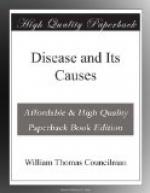by some that phagocytosis of living bacteria took
place, and that all those included in the cells were
dead, having been destroyed in the first instance
by the serum. The strife became a national one
between the French and Germans,—on the
one side in France the phagocytic theory was defended,
and in Germany, on the other, the theory of serum
immunity. The mass of experimental work which
poured from the laboratories of the two countries
in attack and defence became so great that it could
not easily be followed. It had a good influence
because, without the stimulation of this national rivalry,
the knowledge which gradually arose from this work
would not have been so quickly acquired. It is
interesting that the mode of action of the serum in
destroying bacteria was demonstrated not by a German
but by Bordet, a French observer and a pupil of Metschnikoff.
He showed that the serum contained two distinct substances,
each necessary for the destructive action. The
separate action of these substances can be studied
since one is thermolabile, or destroyed by heating
the serum to one hundred and thirty-three degrees;
the other thermostabile, or capable of withstanding
a greater degree of heat. These substances are
known only by their effect, they have never been separated
from the serum. The thermostabile substance, or
amboceptor, as it is generally called, has in
itself no destructive action on the bacteria; but
in some way so alters them that they can be acted
on by the thermolabile substance called complement
whose action is destructive. The amount of amboceptor
may increase in the course of infection and its formation
stimulated, the amount of complement remains unchanged.
The action of the amboceptor is specific, that is,
directed against a single species of bacterium only;
the destructive power of the blood may be very great
against a single bacterium species and have no effect
on others. There seem naturally to be many different
amboceptors in the blood, and the number may be very
greatly increased. It has been shown as a result
of the work of many investigators that the shield has
two faces,—there is destruction both by
cells and fluids and there is interaction by both.
The amboceptors so necessary for the destructive action
of the serum are produced by the body cells, particularly
the leucocytes. The serum assists in pagocytosis
by the action on bacteria of substances called opsonins
which are contained in it, and the formation of which
can be very greatly stimulated. Again, not all
inclusion of bacteria within leucocytes is indicative
of phagocytosis; in many cases the bacteria seem to
find the best conditions for existence within the
leucocytes, and these and not the bacteria are destroyed.




